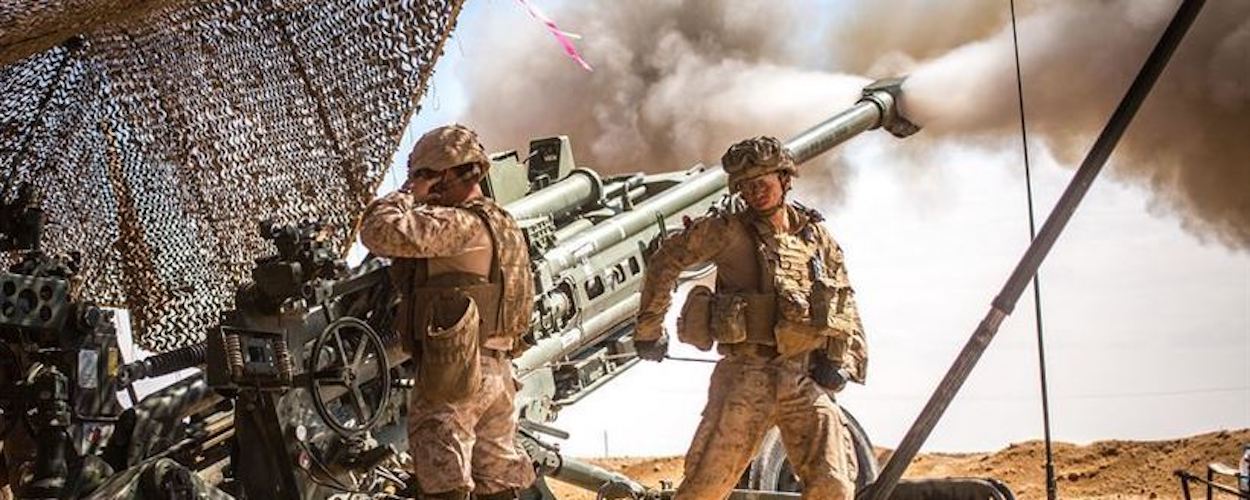Will Congress Confront Trump Administration’s Syria War “Adhocracy”?
This article was originally published in Huffington Post.
For a statement that was intended to read like a bright red line, this week’s White House statement on Syria created more confusion than clarity. The statement warned the Assad government that it will “pay a heavy price” if it carries out a chemical weapons attack — an attack the White House claimed Syria was making “potential preparations” for.
Most coverage of the Syria statement focused on its awkward rollout. One U.S. Central Command source said they had “no idea” what prompted the statement. The New York Times reported that “several military officials were caught off guard by the statement,” and sources at the State Department and the Pentagon seemed to be equally in the dark. This opacity flies in the face of the normal interagency process that usually precedes big White House announcements of any kind let alone the drawing of red lines.
Richard Haass, the president of the Council on Foreign Relations, has dubbed Trump’s foreign policy “adhocracy” recently calling the administration “a decentralized, improvisational administration.” That’s putting it charitably. One day Trump is delegating military policy decisions to battlefield commanders, the next day he’s blindsiding Central Command. This type of improvisation is plain reckless when thousands of lives hang in the balance.
The grim and glittering chaos that is the Trump White House is as hypnotizing as a car crash. That chaos sustains an ongoing and important narrative that the media understandably homes in on. So this week’s Syria coverage has focused on that aspect of U.S. policymaking. But as terrifying as Trump’s military adhocracy is, the larger story is the dangerous direction it’s driving U.S. Syria policy in.
Lost in most coverage of the White House Syria threat is that the use of U.S. military force against Assad’s forces or their allies violates both U.S. and international law. President Obama argued that under U.S. law, operations against ISIS in Syria were justified because of the 2001 war authorization that allows for the targeting of al Qaeda and groups associated with it. That’s a very questionable claim given the longstanding rivalry between ISIS and al Qaeda. But not even the most aggressive interpretation can claim that the 2001 authorization covers the use of force against the Syrian government or its allies.
There are also strategic questions worth unpacking. For example: what exactly do we expect to gain by exacting “a heavy price” against Assad’s forces should they launch a chemical weapons attack?
The administration’s explanation for the first U.S. strike against Assad was that it was meant to deter further chemical weapons attacks. So assuming Assad’s forces were responsible for the chemical attack in April, an allegation the administration has yet to offer proof of, and assuming the administration assessment was correct and Assad was or is preparing another chemical weapons attack, the first U.S. strike was by the administration’s own rubric a complete failure. There’s little reason to think another strike would have more success.
Congress and the U.S. public must also debate this key question: How does the administration plan to avoid a full-scale war with the Syrian government and the inevitable quagmire it would create? With each new escalation against Assad and his allies, the U.S. becomes more and more entangled. Following the U.S. strikes in April justified as a deterrent, U.S. forces conducted a series of attacks against pro-Assad forces and recently downed a Syrian jet, claiming self-defense of U.S. coalition partners battling ISIS. Now with the administration’s new threat, the rationale for continuing to strike Syrian forces has shifted yet again to include making them “pay a heavy price.”
At what point are we committing to stay in Syria not only until we “crush and destroy ISIS” as Trump has promised to do, but also until we topple Assad, prop up a new government, and ensure this new government can maintain peace and stability on its own, like we did in Iraq, Libya and Afghanistan? Average Syrians and Americans will be the ones paying a heavy price if we allow recent history to repeat itself.
Of course, as disastrous as a U.S.-Assad grudge match would be, it would pale in comparison to war with Russia. In response to the string of U.S. escalations since April, Russia suspended its participation in an agreement to avoid mid-air incidents between Russian and U.S. coalition aircraft, stopped using a hotline between U.S. and Russian forces set up to de-escalate tense situations, and said it will track U.S. coalition planes west of the Euphrates River as targets.
These policy shifts, both U.S. and Russian, have created an incredibly volatile situation where accidental and intentional confrontations between U.S. and Russian forces are much more likely than they were a few months ago. The risks of a U.S.-Russia conflict can hardly be overstated as both countries maintain and work to expand their vast nuclear weapons arsenals.
Despite all the risks, Congress, the branch of government tasked with deciding whether or not the U.S. goes to war, still hasn’t held a formal debate let alone a vote on whether or not to authorize the use of force against ISIS or the Assad government. Thanks to the stalwart leadership of Representative Barbara Lee (D-CA), that may be about to change.
In the House Appropriations Committee today, an amendment to the defense appropriations bill offered by Rep. Lee that would sunset the 2001 war authorization passed in a voice vote with strong bipartisan support. While the repeal still has several hurdles to clear before becoming law, it tees up a debate on the House floor on whether or not maintaining a 16-year-old authorization for war with no geographic or time limits is really in our nation’s best interest. If reason prevails, Congress’ blank check for endless war may finally bounce.






